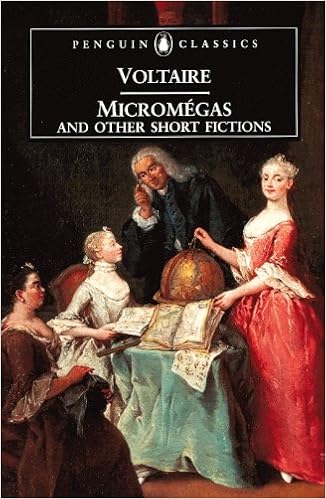Voltaire’s Micromegas, a 1752 novella, is a philosophical satire disguised as a science fiction. Though the use of the concept of an Outsider was
much in vogue in fiction in his time, they mainly discussed Earthlings visiting
remote places. In Voltaire’s Micromegas, the hero comes from a distant planet that orbits the star named Sirius. Though
apparently this book may read like a simple sci-fi story with a touch of humour
here and there, I found layers of meaning hidden inside the plot. Micromegas,
as per my understanding, is a satire that is to be understood in its specific
political and philosophical context. Though there may be more than a hundred
interpretations of this, in my review, I’ll stick to my own understanding.
Before going into details, let me first tell you a thing or
two about the hero Micromegas. He has an enormous body. He is about 20, 000
feet tall. The planet that he came from was
21,600,000 times greater in circumference than our little Earth. The
lifespan of its inhabitants are also quite long. Our hero had reached the end
of his infancy in his 450th year. During this time, he had written
some highly controversial treaties on biological science, because of which he
had faced a trial that lasted 220 years and ended in his banishment from the
court for 800 years. I am mentioning all this because while reading Micromegas,
you’ll know that proportion is an important factor in this book. Everything
about Micromegas is an extension of humans, but not just any arbitrary
extension. The extension is well calculated and proportional. The name ‘Micromegas’
itself denotes the hero’s relative position in the vast universe. He is micro
or small with respect to some, and megas or big with respect to some other.
Voltaire’s hero Micromegas also possessed knowledge that was
an extraordinarily vast. In his youth he had done extensive research in
Entomology. He had written a book about that. But that book eventually landed
him in trouble. A mufti of his country – an
extremely ignorant worrywart, found some suspicious, rash, disagreeable, and
heretical propositions in his book. That led to his trial. Ironically, jurisconsults who had not read the book
condemned it and banished him from the court. It is to be noted that when
Micromegas wrote an amusing song mocking the same mufti, it hardly drew any
attention. This incident is surprisingly similar to Voltaire’s own life story.
He mainly argued for religious tolerance and freedom of thought. He campaigned to eradicate priestly and aristo-monarchical authority, and supported a constitutional monarchy that protects people’s rights.
Source: Wikipedia
As a result of his dispute with the authority, he was twice
sentenced to prison and once to temporary exile to England. In fact, it was
during one such imprisonment in Bastille, he adopted the pen name Voltaire (his
real name was Francois Marie Arouet). Voltaire tried to make the best of his
stay in England. He mastered the language in about a year. He extensively
studied Bolingbroke, Pope, Addison and Swift and marvelled at the amount of
freedom these English authors enjoyed.
There was no Bastille here, and no lettres de cachet by which titled pensioners or royal idlers could send their untitled foes to jail without cause and without trial. Here were thirty religions, and not one priest.
Source: The Story of Philosophy; Will Durant
Later his Letters on
the English was to bring about the revolutionary fervour into French soil.
The point is: Voltaire, like Micromegas, turned his exile to his advantage.
Micromegas, during this time, took to travelling from planet to planet in order
to extend his knowledge. The vehicle he employed, said Voltaire, used
technology yet unknown to us. However, we could only assume that it made
effective use of the law of gravity. It is to be noted that during his stay in
England, Voltaire had attended Issac Newton’s funeral where he came to know of
Newton’s works through his half-niece Catherine Conduitt. Voltaire assiduously
followed the works of Issac Newton. Voltaire, in 1738 wrote Elements of the Philosophy of Newton. He
practically brought Newton into France.
Micromegas seemed to be a believer. On various occasions he
mentions ‘Author of Nature’ and ‘Providence’ in his conversation with the
Saturnian philosopher. During his long
voyage he noted that the nature of life on a planet greatly depended on its size.
From senses of its inhabitants to the properties of its matters – everything increased
or decreased in definite proportion. Micromegas attributed all that to
Providence. He along with the Saturnian, decide to continue their voyage
together. They went to Jupiter, then traversed a space of around one hundred
million leagues and approached the planet Mars that, they noted, was orbited by
two moons. It is to be noted that the two moons of Mars – Phobos and Deimos –
were not discovered until in August 1877 by Asaph Hall. How did then Voltaire
arrive at this conclusion? By simple analogy – he said.
I know very well that Father Castel will write, perhaps even agreeably enough, against the existence of these two moons; but I rely on those who reason by analogy. These good philosophers know how unlikely it would be for Mars, so far from the sun, to have gotten by with less than two moons.
Micromegas and his companion arrived at Earth on July 5,
1737. This date is important to decipher some of the historical references made
in this book. They circumnavigated the
globe on foot in 36 hours. That’s nothing unusual considering the huge size
of Micromegas.
The part of Micromegas by Voltaire that’s philosophy started
at this point. The free-thinker from the outer world spotted something moving
in one of the Oceans that he considered nothing more than little pools
encircling the molehills. He picked the thing up. It was a whale. He examined
it for some time and concluded that that a soul should be lodged in a creature
so small, is improbable. He took a microscope and continued their observations.
Something else, almost as large as the whale appeared in the microscope. It was
a ship. Micromegas clipped his nails with a pair of scissors and with those
clips made something like a vast funnel, to hear the feeble sounds the crews
were making. Though at first it sounded like the drone of insects, in a few
hours he was able to get a feel of the language that was French. To communicate,
they placed toothpicks in their mouths,
whose tapered ends fell around the ship. The ship happened to have some
scientists and philosophers onboard. Here Voltaire has mentioned a vessel that
while returning from a voyage to Arctic, sunk somewhere in the Gulf of Bothnia.
I tried to do some research on this, but couldn’t find enough resources to
support it as a historical fact. May be it was just fiction.
When Micromegas hinted that life on Earth must be truly
blissful, the philosophers disagreed and told him about 100,000 madmen of our species wearing hats, killing 100,000 other
animals wearing turbans, or being massacred by them. This is the historical
reference of war between Russia and the Ottoman Empire over the access to the
Black Sea. The war resulted in the Treaty of Nis between Russia and Turkey (29th
Sept, 1739). It should be noted that Micromegas reached Earth on the same month
that is July, when Russian army stormed the Turkish fortress of Ochakov formally
beginning the Russo - Turkish war (1737 - 1739) that those philosophers talked about.
The philosophical discussion then turns to the question of
soul. I think this is the most vital part of the whole story. This helped me to
better understand the way the story of Voltaire’s Micromegas ended. On the
question of soul, the philosophers divided themselves in different camps. Some
mentioned Descartes, another Leibnitz, some quoted Locke. An aged philosopher
among them even quoted Aristotle in its original Greek form. Micromegas
admitted that he didn’t understand Greek very well, to which the philosopher
replied that he didn’t understand it either. Micromegas, surprised at this,
asked him why then he quoted in Greek.
“Because,” replied the savant, “one should always cite what one does not understand at all in the language one understands the least.”
Another philosopher brought up the fantastic theory of
Thomas Aquinas. Their people, their
worlds, their suns, their stars – he said – had all been made uniquely for mankind. At this the aliens laughed
heartily. In the end, Micromegas promised to make them a philosophical book,
written in miniature form for the convenience of humans. The book that he left
was taken to the Academy of Science in Paris. When the secretary opened it, he
saw nothing but blank pages in it.
Voltaire’s Micromegas is a philosopher who came from a
civilization far advanced in all respect than that of humans. Despite being a
possessor of great wisdom, he was receptive to new ideas. He travelled the
universe with humility in his heart and a thirst for knowledge. Genial though
he was in his manners, he detected vanity in the philosophers of Earth. He also
realized that other than mimicking the words of a handful of old philosophers,
human beings hadn’t progressed much. According to my interpretation, this is
the reason why Micromegas left a blank book for us. He wanted us to start
afresh, write our own philosophy, instead of basking in the glory of the
ancients.
|
|
Back to Philosophy Bookshelf



No comments:
Post a Comment